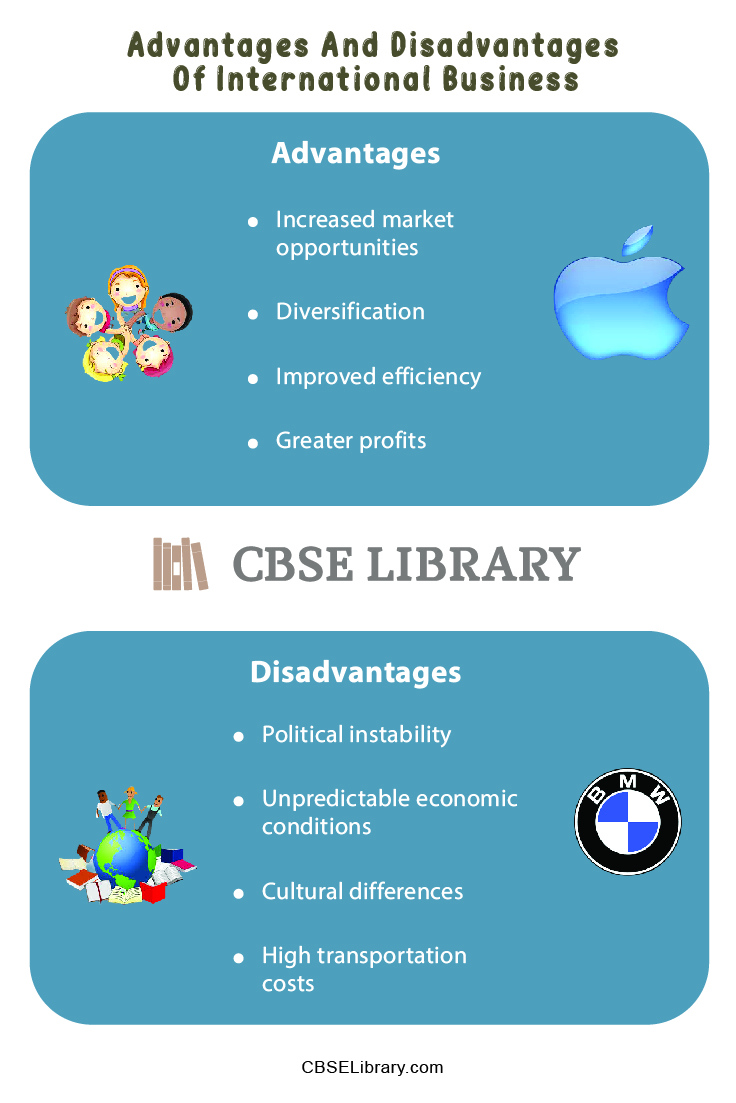International Business Advantages And Disadvantages: International business is a type of business that operates in more than one region or country, usually because the company’s products and services are desired by consumers in different regions and the business venture itself is considered very profitable. This article will look into some of the most common advantages and disadvantages associated with international business.
How is international business defined exactly? International business is defined as the transactions that take place between two or more countries. These transactions can be in the form of trade (i.e. the exchange of goods and services), investment, or aid. There are several reasons why businesses go international. First, it allows for the expansion of businesses into new markets. This can lead to increased profits and market share. Second, international business can help to spread risk by diversifying a company’s customer base and supplier base. Third, international business can lead to increased knowledge and understanding of other cultures. Finally, international business can promote economic development and growth in both developed and developing countries. However, this may not be applicable to all types of businesses.
Students can also find more Advantages and Disadvantages articles on events, persons, sports, technology, and many more.
- Advantages of International Business
- Disadvantages of International Business
- Comparison Table for Advantages and Disadvantages of International Business
- Conclusion on International Business – Advantages And Disadvantages
- FAQs on Advantages And Disadvantages of International Business
Advantages of International Business
International business can bring many benefits to companies and countries. Some of the advantages include:
- Increased market opportunities – by selling products or services in other countries, businesses can reach a larger potential customer base and increase their sales. In other words, when a company expands internationally, it has the potential to reach a much larger customer base than it would if it were confined to its domestic market. Additionally, international business can help a company to diversify its operations, which can protect it from the potentially devastating effects of economic downturns in any one country. Finally, operating in multiple countries can give a company a competitive advantage by providing it with a more global perspective.
- Diversification – One of the main advantages of international business is diversification. By expanding into new markets, businesses can reduce their reliance on any one particular market. This can help to insulate them from economic downturns in any one country and provide opportunities for growth. Additionally, international businesses can benefit from a wider pool of customers and greater potential for economies of scale.
- Improved efficiency – One advantage of international business is improved efficiency. When businesses operate on a global scale, they can take advantage of economies of scale. This means that they can produce more goods and services at a lower cost per unit. This can lead to lower prices for consumers and higher profits for businesses. Additionally, international businesses can benefit from specialization. They can produce goods and services that are better suited to their particular strengths and resources. This can lead to a more efficient allocation of resources and a higher level of overall production.
- Access to new technologies and ideas – One advantage of international business is that companies have access to new technologies and ideas. When companies operate in multiple countries, they can learn about advances in technology and incorporate them into their own products and processes. This helps them to remain competitive and improve their own products and services. Additionally, companies can develop new ideas by working with partners in different countries. By sharing information and collaborating, companies can come up with innovative solutions to problems.
- Greater profits – International business can lead to greater profits for businesses. When businesses expand their operations to other countries, they have the potential to reach a larger customer base and generate more revenue. Additionally, businesses can benefit from lower production costs when they source materials and labor from cheaper international markets. By taking advantage of these opportunities, businesses can increase their profits and grow their operations.
- Improved brand visibility – When a company expands its business to other countries, it can improve its brand visibility. This is because the company’s products and services will be seen by more people in different parts of the world. Additionally, the company may receive more media coverage, which can also help raise its profile. In turn, this can lead to more customers and sales.
Disadvantages of International Business
It can be difficult to expand a business internationally because of the many potential risks and disadvantages involved. These include:
- Political instability – One of the main disadvantages of international business is political instability. This can refer to the overall political climate of a country as well as specific events that could disrupt business operations. For example, trade tariffs and embargoes are often put in place due to political disagreements between countries. This can make it difficult or even impossible to do business with certain countries. Political instability can also lead to violence and unrest, which can make it dangerous to travel to or operate in certain countries.
- Unpredictable economic conditions – One of the main disadvantages of international business is that economic conditions are often unpredictable. This can make it difficult to forecast sales, profits, and other financial indicators. Political instability can also lead to economic uncertainty, which can make it difficult to do business in certain countries. Additionally, exchange rates can fluctuate dramatically, which can impact the bottom line.
- Cultural differences – One of the disadvantages of international business is the cultural differences between countries. This can make communication difficult, as there may be different customs and traditions that need to be taken into account. For example, in some countries it is considered rude to maintain eye contact, while in others it is considered disrespectful to avoid it. This can make it difficult to build relationships with clients and customers from different cultures.
- Language barriers – One of the main disadvantages of international business is language barriers. When companies expand internationally, they often need to communicate with people who speak different languages. This can be a challenge, as not everyone will be able to understand each other. This can lead to miscommunication and misunderstandings, which can be costly for businesses. Additionally, language barriers can also make it difficult to build relationships with customers and partners in other countries.
- High transportation costs – One disadvantage of international business is high transportation costs. This is because businesses have to ship their products to other countries, which can be very expensive. Additionally, businesses may have to pay tariffs or taxes on their products when they enter other countries. This can also make international business more expensive than domestic business.
- Trade Restrictions – One of the main disadvantages of international business is trade restrictions. These restrictions can come in the form of tariffs, quotas, or embargoes. They can make it very difficult for companies to trade with other countries. Trade restrictions can also lead to a decline in the demand for a company’s products.
- Legalities – There are a number of legal issues to consider when doing business internationally. Different countries have different laws, and it can be difficult to stay up-to-date on all of them. There is also the risk of getting caught in bureaucratic red tape. It can be difficult to get permits and visas for employees, and there may be restrictions on what type of products or services can be exported to certain countries.
- Currency fluctuations – Currency fluctuations can adversely affect profits when doing business internationally.
Comparison Table for Advantages and Disadvantages of International Business
Following are the advantages and disadvantages of International Business:
| Advantages | Disadvantages |
| Better market opportunities | Unstable politics can be detrimental |
| Diversification | Unfavorable economic conditions and currency fluctuations |
| Efficiency is increased | Differences in culture |
| New ideas and technologies become accessible | Barriers to language |
| Higher profits | Transportation costs are significantly high |
| Increased brand visibility | Legalities and laws that vary from country to country |

Conclusion on International Business – Advantages And Disadvantages
International business can be a great way to grow your company and reach new markets. However, there are also some potential disadvantages to consider. These include the risk of political instability, cultural differences, and language barriers. Make sure you weigh up the pros and cons carefully before making any decisions about expanding your business internationally.
FAQs on Advantages And Disadvantages of International Business
Question 1.
What is International Business?
Answer:
International business is the term used for businesses that are conducted across national borders. This can include companies that import and export goods and services, as well as those that invest in foreign countries. International businesses must be aware of the different laws and regulations in each country, as well as the cultural differences between them. They also need to have a good understanding of the global economy in order to make the best decisions for their business.
Question 2.
What are the advantages of International Business?
Answer:
There are many advantages to conducting business internationally. First, businesses can tap into new markets and expand their customer base. Additionally, international business can lead to increased profits due to the larger scale of operations. Furthermore, businesses can gain a competitive edge by accessing new technologies and ideas from abroad. Finally, conducting international business can help a company build its brand and reputation.
Question 3.
What are the disadvantages of International Business?
Answer:
There are some disadvantages associated with international business, such as: Increased competition – as businesses expand into new markets, they may face increased competition from both local and international competitors. Political risks – changes in government policies or instability in other countries can lead to risks for companies doing business internationally.
Question 4.
Why is International Business important?
Answer:
There are many reasons why international business is important. One reason is that it allows businesses to tap into new markets and expand their customer base. This can lead to increased revenue and profits. Additionally, international business can help businesses to diversify their operations and reduce their reliance on a single domestic market. This can protect businesses from the effects of economic downturns or other local market conditions. Finally, international business can also help businesses to build brand awareness and establish a global presence.
